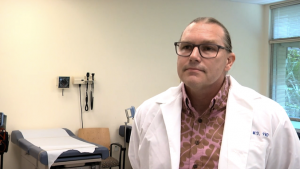VNR: UH physician on Hawaiʻi’s measles threat and vaccination
University of Hawaiʻi at MānoaLink to sound (details below): https://go.hawaii.edu/8F9
*suggested VOSOT script below*
WHO: Philip Verhoef, associate clinical professor at the John A. Burns School of Medicine, University of Hawaiʻi at Mānoa, and intensive care physician.
WHAT: With the ongoing measles outbreak in the U.S, Hawaiʻi also faces a risk. Verhoef discusses the crucial role vaccination plays in preventing the spread of measles, and the importance of herd immunity to protect the most vulnerable, including keiki and immunocompromised people.
WHY: Hawaiʻi's measles vaccination rate is currently at 90%, falling short of the 95% needed for herd immunity, according to the Hawaiʻi Department of Health. This puts the community at greater risk.
KEY POINTS:
- Measles is highly contagious, with 9 out of 10 unvaccinated people exposed likely to develop the disease.
- Measles starts with high fever, cough, runny nose, and red, watery eyes, followed by a rash at the hairline on day 14. It can lead to complications like pneumonia, brain swelling and increased infection risk.
- The MMR vaccine is 93% effective with one dose and 97% effective with two doses, providing protection for both individuals and the community.
- Herd immunity protects those who cannot be vaccinated, such as infants and immunocompromised individuals.
- The first dose of the measles vaccine is given at one year, with a second dose around age four or five.
- The measles vaccine is safe, with common side effects like a mild fever, which are outweighed by the benefits of preventing a potentially deadly disease.
- For more information, read the UH News story.
- View the full AP interview.
Link to sound (details below): https://go.hawaii.edu/8F9
Soundbites:
Philip Verhoef, JABSOM clinical professor/physician
Contagiousness of measles
(0:10)
“Measles is so contagious that if you had 10 unimmunized people exposed to somebody with measles, 9 of the 10 would develop disease.”
Vaccine effectiveness
(0:13)
“The fortunate thing is that the measles vaccine is incredibly effective. Just one shot protects you with a vaccine effectiveness of 93%. Two shots gets you up to 97%.”
Hawaiʻi impact
(0:16)
"Here in Hawaiʻi, we know that we have low measles immunization rates, particularly in the neighbor islands, there are a high number of our keiki who do not have all the shots they need. And that really worries me a lot."
Vaccine hesitancy
(0:17)
When you think about why, why aren't people getting immunizations? I think part of it is because they're scared. Theyʻre afraid the harm of the immunization is going to be worse than the infection itself. Iʻm here to tell you that simply is not the case.
_____
VOSOT Script
INTRO
A measles outbreak in parts of the U.S. has raised concerns in Hawaiʻi, where the 90-percent vaccination rate falls short of the 95-percent needed for herd immunity. Health experts warn that this puts keiki and immunocompromised individuals at risk.
VO
UH clinical professor of medicine and intensive care physician Philip Verhoef stresses the importance of vaccination in preventing the spread of measles and protecting the most vulnerable in the community.
SOT
(Philip Verhoef, JABSOM clinical professor/physician)
(0:10)
<"Measles is so contagious that if you had 10 unimmunized people exposed to somebody with measles, 9 of the 10 would develop disease.">
VO
Verhoef says ensuring children receive both doses of the measles vaccine—one at one year old and the second around age four or five—can help close the gap in immunization rates.
SOT
(0:13)
<"The fortunate thing is that the measles vaccine is incredibly effective. Just one shot protects you with a vaccine effectiveness of 93%. Two shots gets you up to 97%.">
For more information, visit our (newsroom) website

